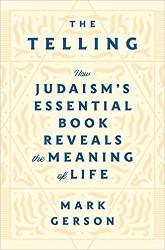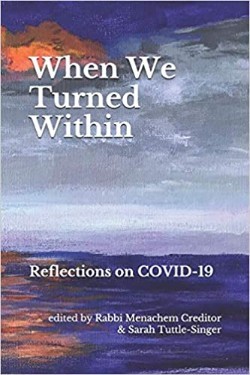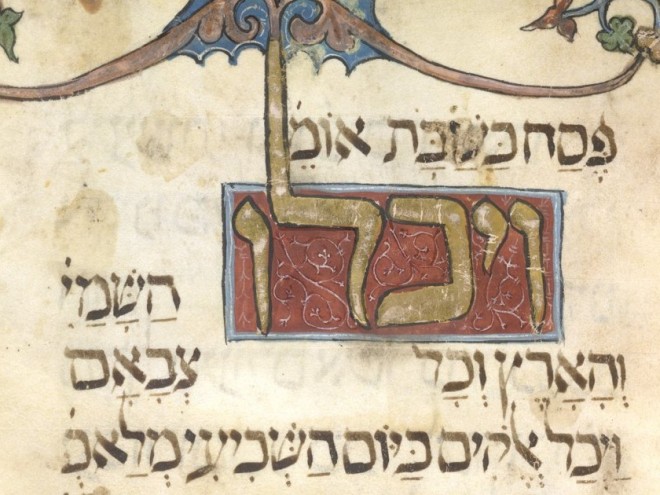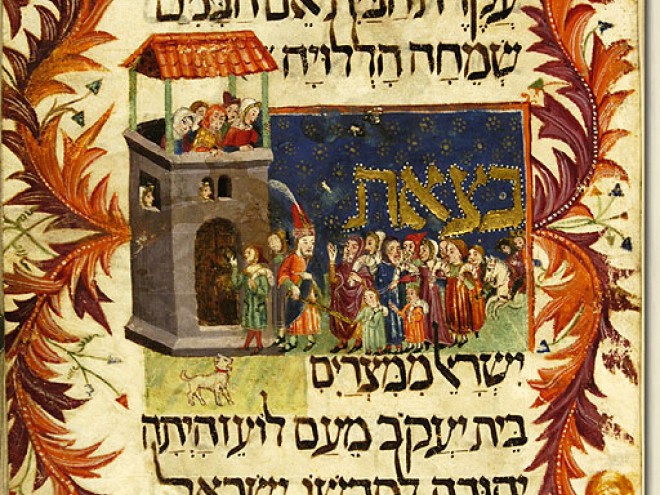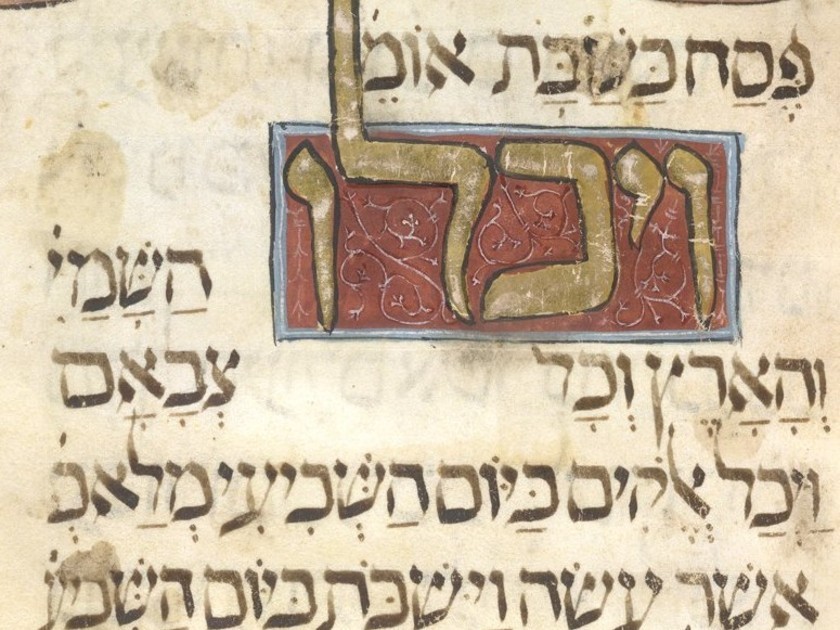
Decorated initial-word panel with foliate scroll spreading to the upper margin from the Haggadah for Passover (the ‘Sister Haggadah’), 1300s, British Library
Several years ago, I asked Tiki Barber — the legendary New York Giants running back — who the most underrated athlete was. It took him barely a moment to respond.
“Tom Brady.”
Tom Brady? I responded that it was hard to think of a more celebrated person, with everyone — even non-sports fans — acknowledging his prowess on the field.
“Right,” Barber said. “All that is true. And yet even all of that understates what Tom has accomplished on the football field.”
Tiki was, as ever, right. That discussion was around five years ago — before Brady was once again a Super Bowl champion, continuing to be an impressive player at an uncommonly old age for a quarterback.
I find myself reflecting on Tiki’s observation as the publication of my book approaches, which looks at how the meaning of life is revealed in the Haggadah. The most celebrated Jewish holiday is Pesach, with far more Jews committed to attending a Seder than observing any other holiday. This is all the more remarkable when we think of the other holiday opportunities there are for Jews to avail ourselves of: Shabbat and Purim, Hanukkah and Sukkot…and so many others!
And yet, Pesach is still the most underrated Jewish holiday — the Tom Brady, perhaps, of Jewish holidays.
The reason why Pesach is at once the most popular and the most underrated holiday is revealed in the distance between how we conduct the Seder and how we could conduct the Seder. Many Jews, at all levels of observance, go around the Seder table and read the Haggadah. The difference may lie primarily in how much of the Haggadah is read and how much is skipped — which rolls up to the data point of how long the Seder lasts.
The problem is that the Haggadah is not really a book. Yes, it has words, pages, and is bound like one, but the same can be said of a songbook. And yet no one would say that the experience of, say, Queen’s “Somebody to Love” can best be had through reading the lyrics, stanza by stanza, around the dinner table. One needs Freddie Mercury’s voice, accompanied by the background instrumentals. And the Haggadah needs each of ours, accompanied by the genuinely awesome Jewish teachings and traditions.
This is not just a nice sentiment; it’s in the text. The Haggadah, quoting from the Torah in Genesis 46:27, tells us that, “70 people went down to Egypt.” The problem: there are only sixty-nine people listed in the Genesis text. So who is number seventy? This question has vexed commentators for a long time. Many have suggested that number seventy is Moses’s mother. But then why did the text not list her name, as it listed everyone else’s?
Number seventy must be someone. And the answer, I think, is revealed in the command to regard ourselves as having been in the Exodus. As the Talmud states, “In each and every generation a person must view himself as though he personally left Egypt, as it is stated: ‘And you shall tell your son on that day, saying: It is because of this which the Lord did for me when I came forth out of Egypt.” (Pesachim 116b)
Each of us is the seventieth person. There is no Hebrew word for history because we don’t really recognize history, which is the story of what happened to other people. Instead of history we have memory, which recalls what happened to us. The Jewish story is continuous and unbroken — and each of us should regard ourselves as the seventieth person who “went down to Egypt.”
Everyone has a role in this Pesach story — or in any story that we are in. So, what is the role of each of us in our capacity as the seventieth person? Moses makes this very clear in Exodus 12 and 13: to teach the story to our children, and to ensure that this is done “as an eternal decree” at “the head of months.”
As every teacher, professional or not, knows — education is a mutual activity. Teachers learn just as much from their students, as students learn from their teachers. And one of the many things that a teacher learns is about themselves — both with regards to who they are and who they would like to become.
This process begins with an awareness of when the Seder occurs, and what it is. The Seder occurs two weeks into what the Torah calls the “head of months.” It is, in other words, our authentic Jewish New Year celebration. The Haggadah is our guide to living happier, more meaningful, and more fulfilling lives in the New Year. Or, more simply, it is our guide to just living better.
The questions that the Haggadah enables us to ask go to the heart of who we are and who we might want to be.
The contents of the Haggadah reflects just what we do with our New Year. We educate our children and ourselves in, as Moses instructs, the Exodus. But we define the Exodus very broadly, with references in the Haggadah to events that precede the Exodus (such as Abraham) and to events that happen subsequently (such as Ezekiel and Joel).
The Haggadah is really the Greatest Hits of Jewish Thought — with the Exodus as its defining event. Like all great events, it did not really begin at any singular moment, just as it never really ended. In 1972, the Chinese Premier Zhou Enlai was asked about the impact of the French Revolution. “It’s too soon to say,” he replied.
That is the case with the Exodus. The impact of the Exodus will never be over. It is up to each of us to create the impact, and the Haggadah instructs us how.
The questions that the Haggadah enables us to ask go to the heart of who we are and who we might want to be. This is true for us in our capacity as individuals, Jews, parents, community members, and even Americans. For instance, there is a seemingly strange story at the end of the first section of the Haggadah (Maggid),where the three Rabbis have a plague (or miracle) counting contest; Rabbi Akiva wins with 250. This teaches us that it is better to count more rather than fewer miracles in our lives, and invites us to think about how such an exercise might completely transform how we experience the world.
Beyond miracles, the Haggadah addresses the deepest themes of life, including: mission, music, good and evil, actions and moral character, Jews and gentiles, beginnings and (non) endings, order and freedom, how to feel and express gratitude, joy and happiness, self-transformation, false humility, blessings, parenthood, education, family, forgiveness, second chances, ideology, watching, newness, Zionism and our relationship with God—and much more.
As we approach the authentic Jewish New Year, on Pesach, the Haggadah gives us the opportunity to ask, ponder, answer, and ultimately live these great Jewish ideas, which come from deep inside our tradition and rest on our Seder tables today. The Seder, through the familiar small book that is right in front of us, affords us the easy ability to have the greatest Jewish experience of the year — with the result of making us happier, better people in the year to come. All we have to know is how to experience — not read, but really encounter — this greatest of all experiences: the Haggadah.
Mark Gerson, an entrepreneur, and philanthropist is the co-founder and Chairman of United Hatzalah, the crowd-sourced system of volunteer first response that enables Israelis to be treated within the moments separating life from death following any medical trauma. He is also the co-founder and Chairman of African Mission Healthcare, which enables Christian medical missionaries to provide clinical care, training, and medical infrastructure for people throughout Africa. A graduate of Williams College and Yale Law School, Mark is the author of books on intellectual history and education. His articles and essays on subjects ranging from Frank Sinatra to the biblical Jonah have been published in The New Republic, Commentary, The Wall Street Journal, and USA Today. He hosts the popular podcast The Rabbi’s Husband and writes a weekly Torah column for Christian Broadcasting Network. Mark is married to Rabbi Erica Gerson. They and their four children live in New York City.
